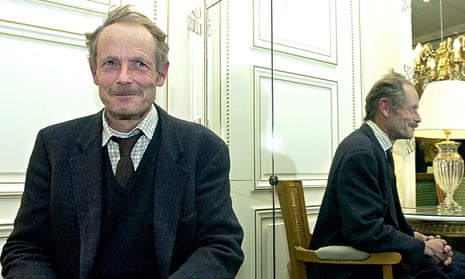Three weeks after the massacre at Charlie Hebdo and the march in Paris which was supposed to display international solidarity over the right of free expression, a court in Turin is about to test the limits of free speech in Italy.
Erri De Luca, 64, one of Italy’s best-known authors, is to stand trial on Wednesday on charges of “incitement to commit crimes”, an offence that could see him serve five years in prison. His crime, according to the prosecution, was to provoke others into action by his support for a resistance movement against a projected high-speed train line between the French city of Lyons and Turin. The incriminating evidence cited by the prosecution is an interview published by the Italian-language Huffington Post website last year, in which De Luca candidly proclaimed that the project deserves to be “sabotaged”.
From the prosecution’s point of view, this was an opinion expressed “with the aim of influencing the behaviour of others”. And to prove their point, the prosecutors are citing a number of attacks in which property was damaged at the construction sites of the company building the railway line. De Luca’s lawyers say he cannot be convicted for his opinions, and that this is a trial against freedom of speech.
Putting a poet in the dock has its hazards. As the writer himself has pointed out, the trial has vastly magnified the impact of his opinions regarding the railway line and its consequences for the Susa valley, through which it is intended to run. De Luca has eloquently argued his own self-defence in a long essay, La Parola Contraria (The Dissenting Word), published this month. Translations are also out in France, Germany and Spain.
In his pamphlet, De Luca dwells only briefly on his motives for taking up the cause of the Susa valley’s “No TAV” (No High Speed Train) movement. He recalls that he has joined demonstrators against the opening of construction sites for what could become the longest tunnel in Europe. He did so, he says, because the project will have a devastating impact on the valley, for the mountain into which excavators have begun burrowing is rich in asbestos, a substance so toxic that “there is no such thing as a harmless level of exposure”. But the heart of his argument is his passionate defence of his right to express his opinion: the right to a “dissenting word”.
For this reason De Luca is calling no witnesses in his defence, no technical expertise in support of his conviction that the projected tunnel is useless. It would not have been difficult to do so, for even the economic rationale of the project is doubtful, and in the wake of a long string of corruption scandals, public opinion has grown wary of vast public works of this type. This trial, says De Luca, is about words, and it is here that he intends to stand his ground. “To sabotage”, as he points out, can have both a practical and a figurative meaning.
It might not seem wise to start an argument with a poet and erudite translator of biblical texts on the meaning of words – particularly one so stubborn as to declare “I can gladly accept a criminal conviction, but not a restriction of our vocabulary”. Such a conversation in a criminal court of law could prove embarrassing for a city that prides itself for its liberal literary heritage, and boasts some of the country’s most respected human rights lawyers and judges. The more venerable among them sigh and politely turn their heads, silently confirming that, yes, holding this trial at all was a mistake.
It was born, like many other trials currently working their way through the Turin courts, in the fury of a sometimes violent conflict over the contentious railway line, which has drawn demonstrators from across the country. A dedicated group of prosecutors was assigned to deal with the cases, and it was two of these who brought charges against De Luca. They clearly intended to make an example of the famous author. “Had it been the barber from Bussoleno, we would have been more forgiving,” one of them confided to a journalist at the preliminary hearing.
From a local issue of law and order, De Luca’s trial has morphed into a national test case on the limits of free speech. This is how the author sees it. The trial’s first victim, he says, is the Italian constitution’s article 21, its free speech clause. So the stakes are high. De Luca thinks he will be convicted. The Italian penal code gives a very open-ended definition of incitement, so convincing the judges could be a hard call for his lawyers.
An appeal to the European court of human rights, where the author’s intransigent stance on freedom of speech would most likely have been upheld, will not be an option: De Luca has already declared that he will not appeal the sentence. So it will be up to the judges in Turin to either convict a troublesome poet or uphold the principle of free speech so recently championed in Paris by politicians of all stripes.
